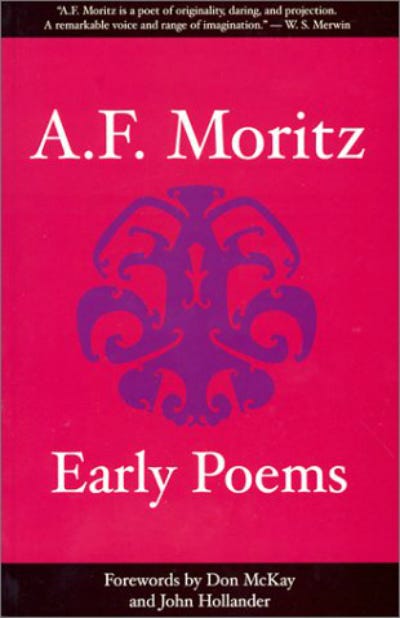A. F. Moritz's Early Poems
Flashback to the 70s
A. F. Moritz recently won the Al and Eurithe Purdy Poetry Prize for his 2024 release Great Silent Ballad, but I don’t have that book, so I’m going to look at his Early Poems. My copy is a Whitehorse Public Library discard, which—I mean, come on, Whitehorse Public Library, I love you, but you barely have any poetry as it is—what were you thinking?
Early Poems collates Moritz’s first four books, originally published between 1974 and 1982. Four books is a lot of books. It’s hard to get your head around this quantity of sustained brilliance, and I’m not even going to attempt a comprehensive review. Moritz writes in such a dreamlike style here, it’s possible to impart layers of meaning to each poem. The reading is experiential rather than literal. The flow of images induces a trancelike state where thoughts flicker and flash; results may vary depending on the contents of the particular reader’s subconscious. Moritz’s lines are of a luminosity that dazzles and blinds. Take, for example, the enigmatic opening to “The Extreme Situation”: “The wild man had committed a violin / and went on in his teeth, which were after all / the gift of nature, to soap a million, never / giving them a chance. Nothing but soap: / imagine the horror of it, to be trapped / in a small room with a soap maniac, / knowing there’s no escape, / gradually ceasing to care or even to notice.”
What is happening here? The wild man, nature; soap, cleanliness as tyranny, enclosed spaces; some sort of integration of extremes that leads not to enlightenment but to apathy. Or—something else entirely. Possible interpretations radiate from such a text.
Moritz has a genius for the numinous phrase. “… Now I know / how to breathe the golden dust / of my threshing floor and not be turned to gold.” Or, “… To what / purpose each winter the moaning chords / of night drag out their limp tails / longer, and with reptilian stares / rekindle soot in the day’s face.” But he manages to be funny at the same time, as in “Black Orchid” where he imparts a sacredness to the act of peeing outdoors: “A black orchid convokes bees / at your body’s center, / a stem of urine / connects it to the ground.”
One thing did irk me while reading, and that’s the treatment of women, who tend to come up as blank, mindless bodies, or the fleshy forms of landscapes (e.g. snowdrifts like white breasts). I’m going to put that down to the poet’s relative youth at the time, plus it being the 1970s. And it’s partly redeemed by the final piece in the book, a 9-page extended poem narrated by the Biblical Elisabeth whose unborn baby “leaped in her womb” upon encountering the pregnant Mary. While this doesn’t exactly pass the Bechdel test, it does give searing, prophetic voice to a woman: “… You saw / in your coming how the weeds are now water-snakes, / with eyes and slit mouths hidden in folded masses, / asleep on the swell that is God / or stricken Judea—these waves of dust.”
So that’s all right then?
About the Author
A native of Niles, Ohio, A.F. Moritz has lived in Toronto since graduating from Marquette University in Milwaukee in 1974. He teaches literature and creative writing at the University of Toronto. His poetry has received the Award in Literature of the American Academy and Institute of Arts and Letters, as well as Canada Council, Guggenheim Foundation and Ingram Merrill Foundation fellowships. He has translated books by Ludwig Zeller including In the Country of the Antipodes: Selected Poems 1964 1979 and The Ghost's Tattoos.
About the Reviewer
Dawn Macdonald lives in Whitehorse, Yukon, where she grew up in a cabin down a dirt road without electricity or running water. She studied applied mathematics and physics at university, and went to her scholarship interview wearing shoes she had found at the dump. Her summer student projects in space physics involved numerical modeling of the northern lights. Her poetry appears in magazines such as The Antigonish Review, Asimov’s Science Fiction, Canadian Literature, The Fiddlehead, FOLIO, Grain, Literary Review of Canada, The Malahat Review, Nat. Brut, OxMag, Strange Horizons, and Vallum: A contemporary poetry, among others. Northerny is her first book.
Publication Details
Publisher : Insomniac Press
Publication date : June 15 2002
Language : English
Print length : 238 pages
ISBN-10 : 1894663187
ISBN-13 : 978-1894663182





